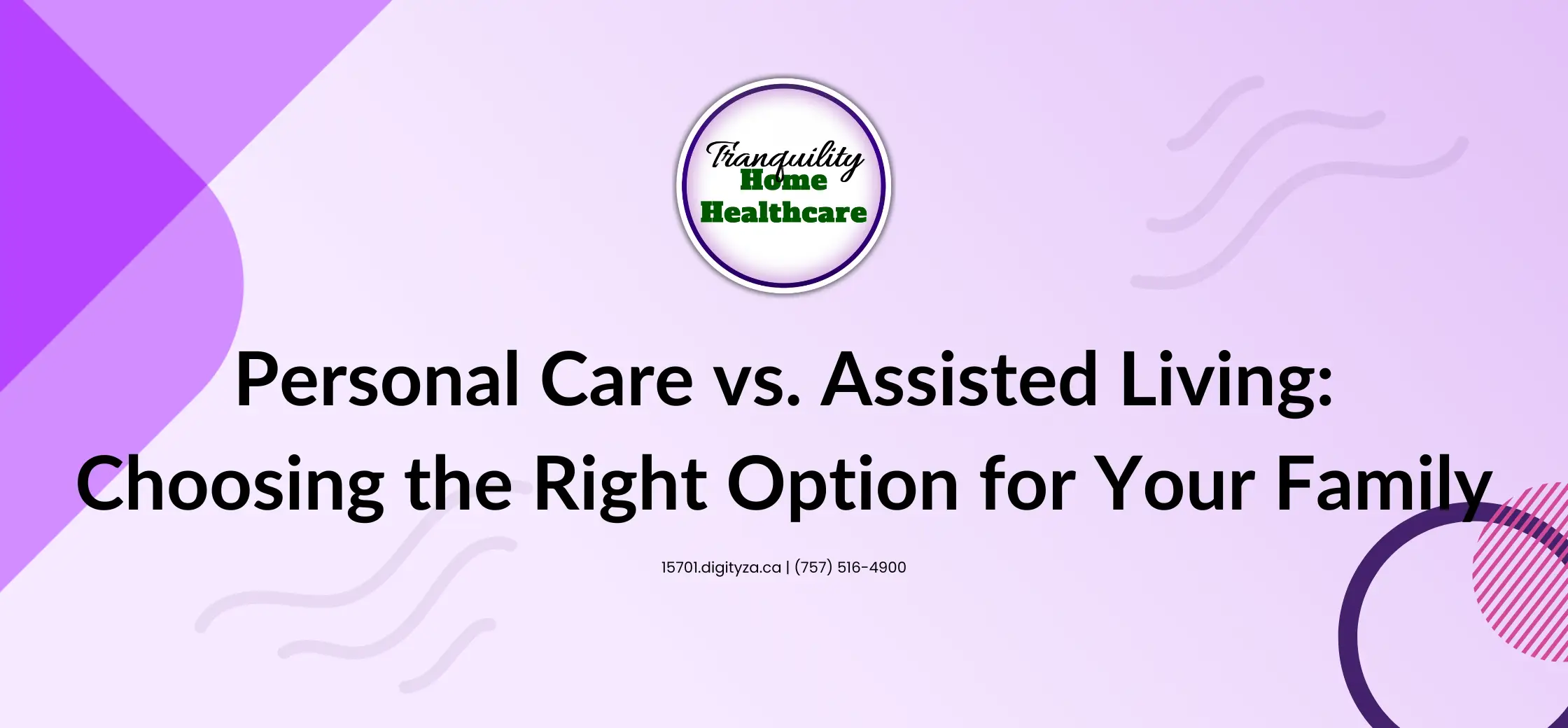Personal Care vs. Assisted Living: Choosing the Right Option for Your Family
When it comes to finding the right care for a loved one, families often face a crucial decision: should they choose personal care services at home or opt for assisted living? This decision can be overwhelming, as each option offers unique benefits depending on the senior’s needs, preferences, and health status. In this blog, we’ll compare personal care and assisted living, helping you determine which is the best fit for your loved one.
Understanding Personal Care for Seniors
Personal care refers to in-home assistance with everyday tasks like bathing, dressing, meal preparation, and medication reminders. It’s a flexible, individualized option that allows seniors to stay in their own homes while receiving support tailored to their specific needs. Personal care services are typically offered by trained caregivers who ensure seniors’ safety, comfort, and well-being in a familiar environment. Learn more about personal care services here.
What Is Assisted Living?
Assisted living involves relocating seniors to a community-based facility where they receive comprehensive support. These facilities offer a variety of services, including meal preparation, housekeeping, medical monitoring, and social activities. Assisted living provides a structured environment where seniors have access to round-the-clock care, making it suitable for those with more complex needs.
Personal Care vs. Assisted Living: Key Differences
Choosing between personal care and assisted living can be challenging. Here are the main differences to consider:
1. Location and Environment
- Personal Care: Seniors receive care in the comfort of their own home, which helps maintain their independence and familiarity with their surroundings.
- Assisted Living: Seniors move into a new residence, designed to offer a supportive community atmosphere with access to professional care 24/7.
Why it Matters: If your loved one values familiarity and wants to remain in a familiar space, personal care is ideal. However, if they require constant supervision, assisted living may be more appropriate. Explore more about in-home care.
2. Level of Care
- Personal Care: This option provides personalized assistance based on specific needs, from occasional help to full-time care.
- Assisted Living: Offers a broader range of services, including healthcare monitoring, medication administration, and emergency response.
Why it Matters: Consider your loved one’s health needs. If they require ongoing medical attention, assisted living may be more suitable. For less intensive support, personal care can be adjusted to meet changing needs over time.
3. Social Interaction
- Personal Care: Caregivers offer companionship and social support, but the level of social interaction may depend on family involvement and community engagement.
- Assisted Living: Seniors have access to a wider range of social activities, group events, and community dining, which can enhance social interaction.
Why it Matters: If your loved one is socially active, assisted living offers more opportunities for engagement. For those who prefer a quieter setting or have a strong family support network, personal care at home may be better suited. Learn about companionship services.
4. Cost and Affordability
- Personal Care: The cost varies based on the number of hours needed and the level of care provided, making it more flexible and often more affordable than assisted living.
- Assisted Living: Costs are typically higher due to the comprehensive nature of services and amenities provided in a community setting.
Why it Matters: Budget is an important consideration. If affordability and flexibility are priorities, personal care might be the better choice. However, if financial resources allow and more comprehensive care is needed, assisted living may offer better overall value.
Deciding Between Personal Care and Assisted Living
When choosing between personal care and assisted living, consider these factors:
1. Health Needs and Medical Requirements
Assess your loved one’s medical conditions, mobility, and daily support requirements. If they need more frequent medical attention, assisted living may be a safer choice. For relatively independent seniors, personal care services can provide the right level of assistance without uprooting their daily lives.
2. Personal Preferences and Comfort
Your loved one’s comfort and preferences should be central to the decision-making process. Some seniors thrive in community settings, while others find peace in the privacy of their own homes. Engage your loved one in the discussion to ensure their voice is heard and respected.
3. Family Involvement and Support
If family members are nearby and can be actively involved in caregiving, personal care may be more effective. On the other hand, if family support is limited, assisted living can provide the constant supervision and support needed. Learn about how in-home care can help.
4. Future Planning
It’s essential to consider how your loved one’s needs may change over time. Personal care can be adjusted as needs evolve, while assisted living offers a more stable, long-term solution. Whichever option you choose, ensure that it aligns with your loved one’s current and future requirements.
Choosing the Best Senior Care Option
Deciding between personal care and assisted living is a significant step in supporting your loved one’s health, comfort, and quality of life. While personal care offers a flexible, cost-effective solution for seniors who want to remain at home, assisted living provides comprehensive care in a community setting. Evaluate your loved one’s needs, preferences, and budget to make an informed decision.
If you’re considering personal care services for your loved one, reach out to Tranquility Home Health Care. We offer personalized care plans that prioritize safety, comfort, and independence.

